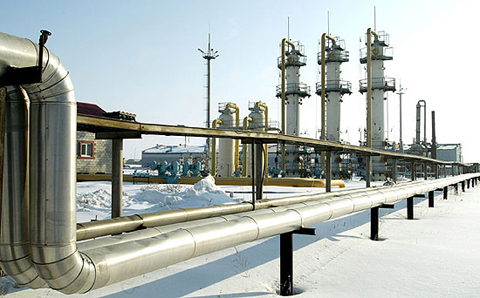Natural Gas Gaining Momentum
8 Apr, 2009 09:52 am
I have said a number of times that I would prefer to take the natural gas we use to make ethanol and just use it directly in compressed natural gas (CNG) vehicles.
 |
But I learned something of interest today when I was flying back to Texas from Europe. I am currently reading Oil 101
But the landscape may be starting to change. Of course T. Boone Pickens has been pushing CNG hard as part of his Pickens Plan. Then last month AT&T announced they would invest $565 million to replace 15,000 gasoline-powered fleet vehicles with compressed natural gas and hybrid engines. And yesterday Reps. Dan Boren (D-Okla.), John B. Larson (D-Conn.) and John Sullivan (R-Okla.) introduced new legislation to further incentivize CNG:
House members plan bill to expand NGV use
Known as the New Alternative Transportation to Give Americans Solutions (NAT GAS) Act, the bill also would create a new tax credit for automakers which produce natural gas and bi-fueled vehicles, the three federal lawmakers said. Currently, all major automakers manufacture NGVs for overseas markets and this provision is critical to encourage them to begin offering NGVs in the United States, they said.
Energy investor T. Boone Pickens applauded the measure. "America's national and economic security depends on moving off foreign oil as quickly as possible. Natural gas is the cleanest, most abundant, most economic fuel to replace imported diesel fuel. The US has enough natural gas to last more than 118 years; we should turn to it as an immediately replacement for foreign oil in fleets and heavy-duty vehicles," he said.
I will have to look into the context of that 118 year claim a bit later. But the U.S. is certainly in better shape with respect to our gas reserves than we are with our oil reserves. Further, gas can be produced renewably from the same feedstocks that go into any other biofuel.
Of all the schemes promoting energy independence, a massive expansion of CNG just might have a chance of displacing enough oil to achieve at least independence from the Mideast and Venezuela. Again, it will take many components, but I don't see any possible way it can be achieved without a healthy contribution from domestic oil and gas production
Originally published in R-Squared Energy Blog
-
12/12/12
Peak Oil is Nonsense Because Theres Enough Gas to Last 250 Years.
-
05/09/12
Threat of Population Surge to "10 Billion" Espoused in London Theatre.
-
05/09/12
Current Commentary: Energy from Nuclear Fusion Realities, Prospects and Fantasies?
-
04/05/12
The Oil Industry's Deceitful Promise of American Energy Independence
-
14/02/12
Shaky Foundations for Offshore Wind Farms







Up to 90% substitution of diesel can be reached under full load, and the engine can run on 100% diesel or biodiesel if no natural gas can be found.
You can have a multi part transistion to more efficient diesel vehicles with low emissions from the natural gas substituiton.
Make greater use of domestic gas production including biogas, shale gas and coal bed methane.
A role out of short range plug in hybrids with diesel / natural gas range extenders can also act as distributed CHP plants where domestic natural gas is available.
You can also dump 5-30% hydrogen into the natural gas distribution network if you need a dump load on a windy night.